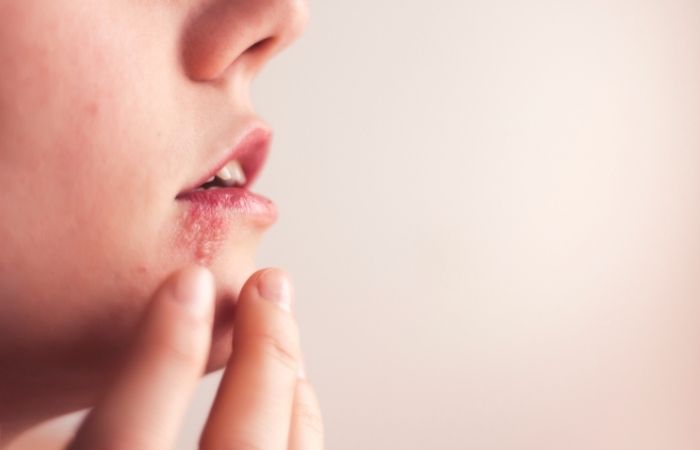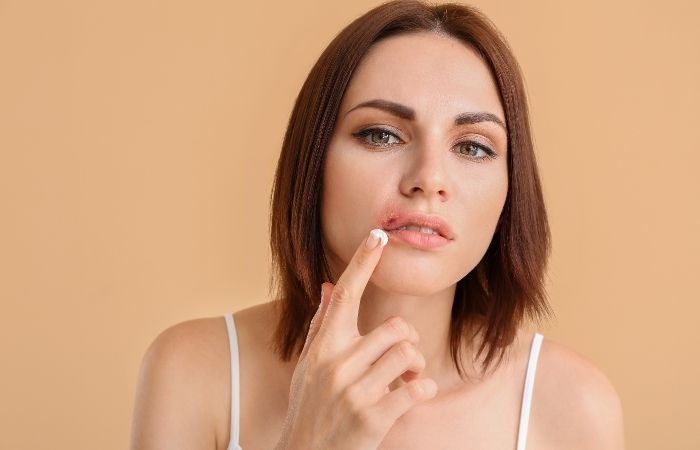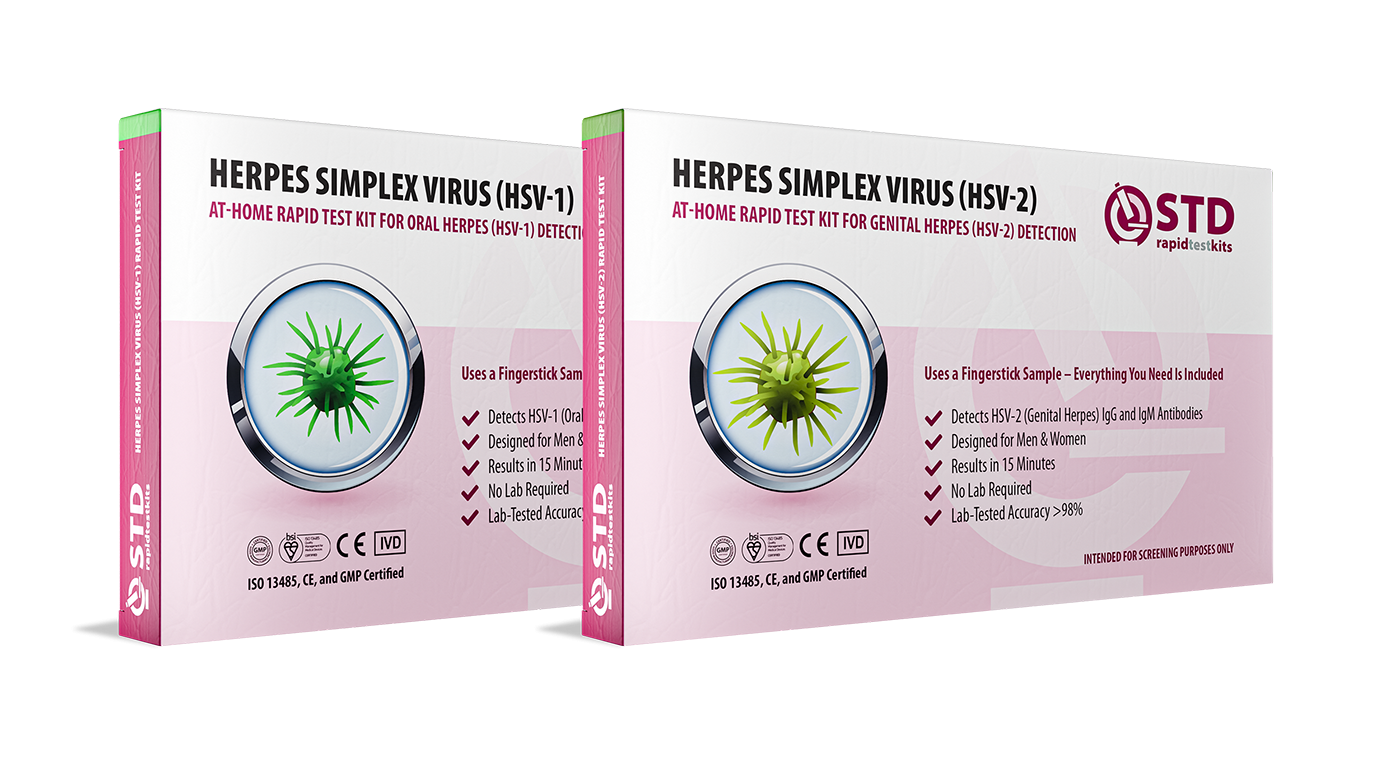Quick Answer: Herpes is a common viral infection spread through skin-to-skin contact. Cold sores and genital herpes are caused by the same virus, and having it doesn’t make you dirty or unworthy of love.
“I Thought My Dating Life Was Over”: Real Stories of First Outbreaks
Ellie, 26, still remembers the first time she noticed a small, painful sore on her lip during a work trip. “I thought it was just a weird pimple until a friend said it might be a cold sore. I went into a full shame spiral. I kept thinking, ‘Who will ever want to kiss me again?’”
“The hardest part wasn’t the sore, it was the shame. I spent hours Googling ‘am I dirty now?’”
Like Ellie, millions of people experience this mix of confusion, fear, and embarrassment during their first encounter with oral herpes (HSV-1) or genital herpes (HSV-2). The good news? That initial panic usually fades once people realize how common herpes is, and how easy it is to manage with the right information and support.
According to the World Health Organization, roughly 3.7 billion people under 50 carry HSV-1, the strain that most often causes cold sores. And over 491 million people live with HSV-2 worldwide. Translation: You are far from alone.

People are also reading: Private, Fast, and 92% Accurate? At-Home STD Tests Explained
Cold Sore or Pimple? Spotting the Early Signs
One of the most common late-night searches is, “cold sore or pimple?” Early herpes symptoms can be subtle or confusing. A small red bump might be dismissed as acne or an ingrown hair. But herpes outbreaks usually follow a pattern that sets them apart:
- Tingling or Burning: A warning sign before a sore appears, often on the lip edge or genitals.
- Small Fluid-Filled Blisters: These can cluster and eventually burst or crust over.
- Recurring in the Same Spot: Herpes often reactivates in the same general area during future outbreaks.
Unlike a random pimple, herpes sores tend to be more tender, may form clusters, and are often preceded by that telltale “tingle.” The first outbreak can be the most intense, but many people experience milder or even symptom-free recurrences.
And here’s a comforting truth: having herpes doesn’t mean you’re contagious all the time. Most transmission happens during an active outbreak or shortly before one, but not every moment of your life is high-risk.
How Herpes Really Spreads (And Why Shame Doesn’t Protect You)
One of the most damaging myths about herpes is that only “promiscuous” people get it. The reality? Herpes spreads easily through simple skin-to-skin contact. It doesn’t care if you’ve only kissed one person in your life or fifty.
Here's what you need to know about transmission:
- Kissing, sharing drinks, or oral sex can spread oral herpes (HSV-1), even if there are no visible sores.
- Skin-to-Skin Contact: Genital herpes (HSV-2) spreads mostly through oral, vaginal, or anal sex. Condoms lower the risk, but they don't completely stop it because the virus can live in places that condoms don't cover.
- Asymptomatic Shedding: The virus can sometimes be passed on even when there are no sores, but this is much less likely to happen when there are no active outbreaks.
According to the Centers for Disease Control and Prevention (CDC), most people who transmit herpes don’t even know they have it. This is why shame doesn’t protect anyone, only awareness, testing, and communication do.
Dating With Herpes: Real Talk and Reassurance
Marcus, 32, was terrified to start dating again after his first genital herpes outbreak. “I imagined the conversation going horribly, like someone would run screaming. But when I finally told someone I liked, she said, ‘Oh, I get cold sores too.’ I couldn’t believe the relief I felt.”
“I realized the shame I was carrying was heavier than the virus itself.”
Dating with herpes requires honesty and confidence, but here’s the reality: many people will respond with empathy, not rejection. Talking openly, when you feel ready, can strengthen trust with a partner. Experts recommend disclosing before sexual activity, but you don’t have to lead with it on a first coffee date.
And here’s an empowering fact: Antiviral medications and consistent precautions can dramatically reduce your risk of passing herpes to a partner. Some couples date for years without transmission when they communicate and manage outbreaks responsibly.
Check Your STD Status in Minutes
Test at Home with RemediumOral Herpes Test Kit

 For Men & Women
For Men & Women Results in Minutes
Results in Minutes No Lab Needed
No Lab Needed Private & Discreet
Private & DiscreetOrder Now $33.99 $49.00
Practical Ways to Protect Yourself and Your Partner
If you’re living with HSV, you can still enjoy a vibrant dating and sex life with a few practical habits:
- Don't touch anyone closely until the sores heal.
- Use Barriers: Condoms and dental dams lower the risk, but they don't completely protect you.
- Think about taking antiviral medicine: daily suppressive therapy can lower the risk of spreading the virus and stop outbreaks.
- Be honest, but don't go into too much detail. Tell your partner the basics: it's common, manageable, and you take steps to protect yourself.
And if you’re worried you might have herpes but aren’t sure, consider discreet testing. Modern at-home STD test kits and combo test kits make it easy to get answers without waiting rooms or extra stress.
Don’t wait and wonder: getting clarity is the most liberating step in dating confidently with herpes.
What Triggers Herpes Outbreaks (And How to Stay Ahead of Them)
One of the most empowering things you can do after a herpes diagnosis is learn your triggers. Outbreaks are often influenced by your immune system and environment. While everyone’s body is different, common triggers include:
- Stress: A lot of stress or emotional exhaustion can make your immune system weaker and let HSV come back.
- Sickness or Tiredness: A cold or not getting enough sleep can make a flare-up happen.
- Exposure to the sun: UV rays can cause oral herpes (cold sores), especially on lips that aren't protected.
- Changes in hormones: Hormonal changes, like those that happen during a menstrual cycle, can sometimes cause outbreaks.
- Skin irritation: Rubbing against something during sex, wearing tight clothes, or shaving can all lead to localized outbreaks.
The good news? Knowing your triggers allows you to take proactive steps like managing stress, protecting your lips with SPF, and using antivirals or lysine supplements if recommended by a healthcare provider.
Managing Your First Outbreak Without Panic
First outbreaks can be emotionally overwhelming, but medically, they’re usually manageable. Symptoms often improve within two to three weeks, and future outbreaks are usually milder and shorter. Here are steps that can help:
- Keep the Area Clean and Dry: This promotes faster healing and reduces discomfort.
- Use Over-the-Counter Pain Relief: Ibuprofen or acetaminophen can help with soreness.
- Apply Cold Compresses: This can ease pain and reduce swelling around sores.
- Consider Prescription Antivirals: Medications like acyclovir or valacyclovir can shorten outbreaks.
- Test for Peace of Mind: Confirming herpes with a test removes the uncertainty and allows you to manage your health confidently.
According to Mayo Clinic experts, early treatment not only speeds recovery but can also reduce how often future outbreaks occur.

People are also reading: You Didn’t Even Have Sex, So Why Do You Have an STD
Emotional Resilience: Living and Dating Beyond the Diagnosis
Living with herpes is less about sores and more about self-acceptance. Stigma often hurts more than the virus itself. Building emotional resilience starts with understanding the facts:
- You’re Not Alone: Billions of people carry HSV, most without symptoms or shame.
- Your Dating Life Isn’t Over: Many people maintain fulfilling relationships and active sex lives after diagnosis.
- Shame Fades With Knowledge: Learning about the virus and talking openly helps dismantle fear.
Kara, 29, says she didn’t tell anyone for months after her first outbreak.
“I felt like damaged goods. But once I finally talked to a friend, she said, ‘Oh, I’ve had cold sores since I was a kid.’ It made me realize how much stigma is just silence.”
Herpes doesn’t define your worth, your dating prospects, or your ability to experience love. In fact, when handled with honesty and care, conversations about herpes can deepen trust and intimacy in ways you might not expect.
How to Talk to a Partner About Herpes Without Fear
For a lot of people, the hardest part of dating someone with herpes isn't the virus; it's the talking. It's normal to be afraid of being turned down, but talking honestly can often be less dramatic than we think.
Here's how to talk about it step by step:
- Choose the Right Time: Before you have sex, but after you've built up some trust. If you can, don't bring it up during the hookup or over text.
- Don't make it complicated: Tell them that herpes is common, easy to deal with, and you know how to stop it from spreading.
- Don't be afraid; focus on the facts. Tell them that more than half of the world has HSV and that taking precautions and taking antivirals can lower the risk by a lot.
- Ask for a Conversation: Let them ask questions, and keep in mind that their first reaction might not be rejection, but surprise.
- Build Your Confidence: Your calm voice is more reassuring to your partner than a long medical lecture.
Planned Parenthood says to use language that is clear and free of stigma, like "I have herpes." It's common and easy to deal with. "I do things to keep my partners safe." You don't have to tell your whole life story, just the important things that will keep you safe and build trust.
Dating, Intimacy, and Pleasure: Yes, You Still Get All Three
One of the most important messages for anyone living with HSV is this: herpes doesn’t end your love life or sex life. With the right awareness and precautions, intimacy is still safe, fun, and fulfilling.
Here are some ways to keep intimacy exciting and safe for your partner:
- Time intimacy around outbreaks: Don't touch skin-to-skin when you have symptoms or for a few days after you heal.
- Look into other ways to protect yourself besides condoms. Dental dams, gloves, and creative positions can all help reduce friction and skin exposure.
- Include Suppressive Therapy: Taking antivirals every day can greatly lower the risk of passing the virus on to partners.
- Talk About Comfort: Being honest with each other makes intimacy better for both of you.
- Keep in mind the big picture: herpes is a skin disease, not a moral sentence. You can still feel pleasure.
Many people discover that the vulnerability of sharing a diagnosis actually strengthens relationships. When approached with honesty and care, dating with herpes can lead to deeper trust, better communication, and yes, great sex.
Check Your STD Status in Minutes
Test at Home with RemediumGenital & Oral Herpes Test Kit

 For Men & Women
For Men & Women Results in Minutes
Results in Minutes No Lab Needed
No Lab Needed Private & Discreet
Private & DiscreetOrder Now $75.00 $98.00
For all 2 tests
FAQs
1. Is it possible to get herpes without having sex?
Yes. You can get herpes from kissing, oral sex, or touching skin to skin, even if you don't have sex.
2. Do I have to be dirty if I have herpes?
No. Herpes is a common virus that has nothing to do with how clean or valuable you are. Half of the world has HSV.
3. Are cold sores and genital herpes the same thing?
The viruses that cause them are similar. HSV-1 is the virus that causes cold sores, and HSV-2 is the virus that causes genital herpes, but both types can show up in both places.
4. If I feel a cold sore coming on, can I kiss someone?
To avoid spreading the virus, it's best not to kiss or touch sores that are tingling, blistering, or active.
5. Will herpes ever go away?
No, herpes stays in the body, but with the right care, outbreaks usually get less severe and less frequent over time.
6. How long does a cold sore stay?
It usually takes 1 to 2 weeks for cold sores to heal. Antivirals or over-the-counter drugs can help you get better faster.
7. Can I still date and have sex like normal?
Yes, for sure. Dating and being close to someone can still be fun if you talk openly, take precautions, and maybe even use suppressive therapy.
8. If I think I have herpes, should I get tested?
Yes. Taking a test to confirm gives you peace of mind and lets you handle the virus in a responsible way.
9. Do condoms completely stop herpes?
No, but they lower the risk a lot. Outside of the condom area, the virus can live on skin.
10. What is the best way to stop herpes from spreading?
Don't touch each other during outbreaks, use barriers, think about antivirals, and let your partners know.
You Deserve Answers, Not Assumptions
Living with herpes doesn’t define your love life, your character, or your future. Stigma fades with knowledge, and confidence grows with clarity. By understanding symptoms, triggers, and precautions, you can date and love without shame.
Don’t sit in the “what ifs.” Take control of your health and your peace of mind with a discreet at-home combo STD test kit. It’s fast, private, and gives you the clarity to move forward with confidence.
Sources
1. CDC – Información esencial sobre el herpes genital
2. Glamour – Cómo salir con herpes: realidades y consejos (mar 5, 2024)
3. Healthline – Sexo y citas con herpes: 12 consejos de alguien que vive con ello
4. Verywell Health – Cómo manejar las citas cuando tienes herpes (jul 2, 2025)
5. Yale Medicine – Cómo el estigma del herpes afecta a los pacientes y obstaculiza la investigación
6. NCBI / PMC – Estudio sobre el estigma del herpes genital y sus efectos psicológicos










